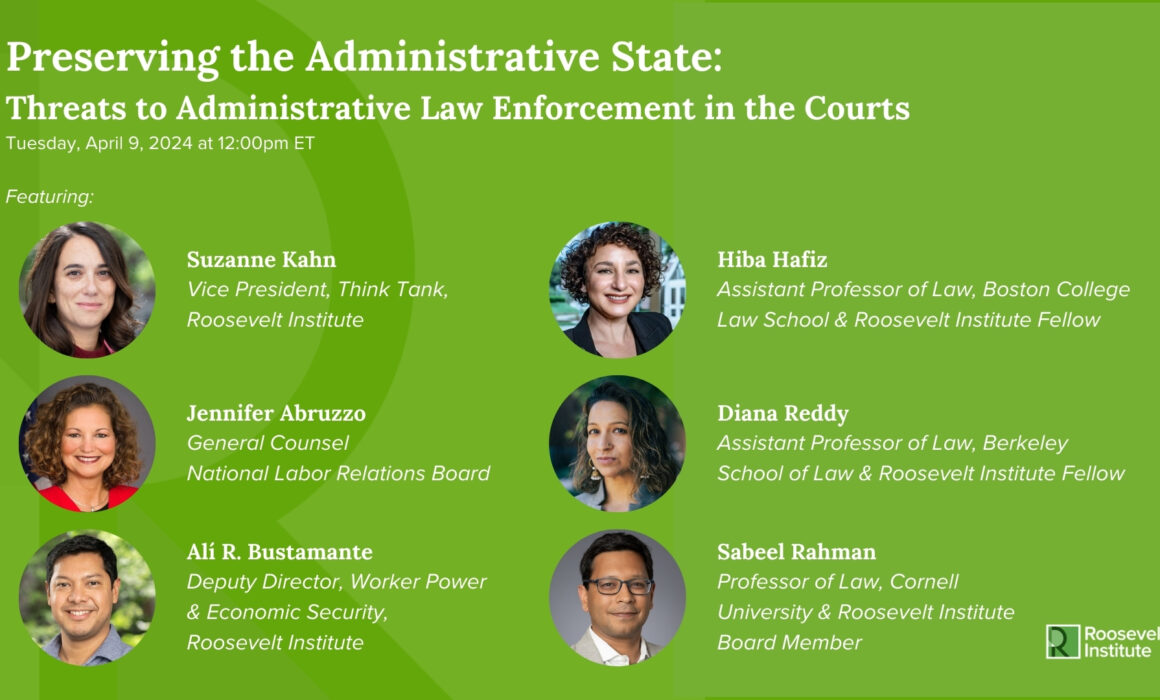Facing enforcement from the National Labor Relations Board (NLRB) over alleged illegal intimidation and retaliation against workers, several giant corporations—from SpaceX and Starbucks to Amazon and Trader Joe’s—are attacking the underlying constitutionality of the NLRB.
These attacks are dangerous, but they aren’t new or unique. Last year, the Supreme Court heard cases challenging the structure and powers of administrative agencies, including the Federal Trade Commission, the Securities and Exchange Commission, and the Consumer Financial Protection Bureau.
On April 9, 2024, the Roosevelt Institute brought together experts to discuss the settled constitutionality of the NLRB and other agencies and just what’s at stake if opponents succeed in dismantling them.
NLRB General Counsel Jennifer Abruzzo discussed the agency’s long-established constitutionality and critical role in protecting American workers. Then, Alí Bustamante, Roosevelt Institute deputy director, moderated a conversation between Sabeel Rahman, professor of law at Cornell Law School and former associate administrator of the Office of Information and Regulatory Affairs; Diana Reddy, assistant professor at UC Berkeley School of Law; and Hiba Hafiz, former expert advisor to the Federal Trade Commission and associate professor of law at Boston College Law school.
In Conversation
Suzanne Kahn
Vice President, Think Tank, Roosevelt InstituteSuzanne Kahn is the vice president of the think tank at Roosevelt where she oversees and helps manage the research projects in all think tank program areas. As vice president of the think tank, Suzanne works with the think tank’s issue area directors to develop critical research and policy to rebalance power in our society and economy.
Read more
Previously, Suzanne was Roosevelt’s director of education, jobs, and worker power and the Great Democracy Initiative. Her research and writing focused on building a network of robust public goods—such as public higher education—and labor organizations that together can empower workers to counter corporate power in the labor market and public sphere.
Prior to joining Roosevelt, Suzanne most recently worked as a research analyst at SEIU 32BJ, where she built a program to organize workers in new residential developments. Suzanne holds a PhD in American history from Columbia University and earned her BA from Yale University. Her book, Divorce, American Style, won the American Society for Legal History’s Cromwell Dissertation Prize. As an undergraduate, in 2005, Suzanne was a founder of the Roosevelt Network.
Jennifer Abruzzo
General Counsel, National Labor Relations BoardJennifer Abruzzo is General Counsel at the National Labor Relations Board, an independent federal agency charged with safeguarding workers’ rights. General Counsel Abruzzo’s appointment in 2021 followed her more than 20 years of experience at the NLRB in various roles ranging from field attorney to Deputy General Counsel.
Read more
From the moment she took the reins to lead the NLRB’s prosecutorial and enforcement activities, General Counsel Abruzzo has made it clear that the Agency is charged with enforcing a statute that is pro-worker. In fact, her first memo directed staff to consider cases that could be used to ask the Board to reverse legal precedent that doesn’t comport with the Agency’s mission, including cases that make it more difficult for workers to unionize, should they want to do so.
Under her leadership, she has issued legal guidance seeking to protect immigrant workers from employer retaliation and to apply Section 7 rights to college athletes. She has pushed for more robust remedies for labor law violations, including full make whole relief for victims of unfair labor practices. She has also dusted off underused legal tools in an effort to get workers promptly reinstated to their jobs after unlawful firings, including by seeking injunctions against high-profile employers in order to stop violative conduct aimed at chilling organizing activities. Abruzzo’s NLRB has embodied the Biden Administration’s whole-of-government approach in ensuring workers feel empowered to fairly and freely exercise their statutory rights without fear of retaliation. Before her current post, Abruzzo was Special Counsel for Strategic Initiatives at Communications Workers of America.

Alí R. Bustamante
Deputy Director, Worker Power and Economic Security, Roosevelt InstituteAs deputy director of Roosevelt’s worker power and economic security program, Dr. Bustamante leads research on democratizing the 21st century economy and centering equity across America’s institutions.
Read more
Alí R. Bustamante is the deputy director of the worker power and economic security program at Roosevelt, where he specializes on how public policy can structure markets around both economic and social value and empower Americans through the provision of public goods and stronger labor protections. Dr. Bustamante is an expert on labor, economics, and public policy and a native Spanish speaker. His research and analysis have been featured on The New York Times, USA Today, NPR, CNN, Forbes, Charities USA, and other media outlets.
Prior to joining Roosevelt, he served as chief economist at the Louisiana Workforce Commission, senior research associate at the Southern Economic Advancement Project, and as faculty at Florida International University, the University of New Orleans, and Loyola University New Orleans.
Dr. Bustamante earned a BA and PhD from the University of Miami, specializing in political economy. Born in Masaya, Nicaragua and raised in Miami, he now lives in New Orleans.
K. Sabeel Rahman
Professor of Law, Cornell University & Roosevelt Institute Board MemberK. Sabeel Rahman is a Professor of Law at Cornell Law School. He is also a co-founder and faculty co-chair of the Law and Political Economy Project. His academic research focuses on issues of democracy, governance, economic power, political economy paradigms, racial equity, and inequality. He works extensively with a range of think tanks, advocacy organizations, and foundations to develop novel approaches to addressing these issues in practice.
Read more
From 2021-2023, he served in the Biden-Harris Administration where he led the Office of Information and Regulatory Affairs (OIRA). At OIRA, he oversaw the policy review and approval of all significant federal regulations and played a lead role in the Administration’s efforts on equity, data and information policy, and reforming regulatory analysis. From 2018-2021, he served as President of Demos, a national racial justice think tank and advocacy organization that played a key role in combating voter suppression and developing and mainstreaming major policy ideas from climate justice to student debt relief to energy democracy.
He is the author of Democracy Against Domination (Oxford University Press, 2017), and Civic Power (with Hollie Russon Gillman, Cambridge University Press, 2019). His popular writings have appeared in venues like The Atlantic, The New Republic, The Boston Review, Dissent, and The Washington Post.
Diana Reddy
Assistant Professor of Law, Berkeley School of Law & Roosevelt Institute FellowDiana Reddy joined UC Berkeley School of Law as an Assistant Professor in 2023. She teaches Contracts, courses in labor and employment, as well as seminars on organized labor and civil rights, law and political economy, and social movement advocacy.
Read more
Diana’s research focuses on the regulation of work as a site where critical choices are made about the relationship between American economic commitments and its democratic ideals. Her recent scholarship has been published in the Yale Law Journal(opens in a new tab), the Yale Law Journal Forum(opens in a new tab), and the Emory Law Journal(opens in a new tab), among others. Some of her shorter pieces are available on the Law and Political Economy blog, examples include “Labor Bargaining and the Common Good(opens in a new tab)” and “Anti-CRT and a ‘Free Market’ in Racial Education(opens in a new tab).”
Before her return to academia, Diana represented labor unions and workers at the AFL-CIO, Altshuler Berzon LLP, and the California Teachers Association. She received her JD, magna cum laude and Order of the Coif, from NYU School of Law, where she was also a Root-Tilden-Kern scholar. Diana clerked for Judge Theodore McKee on the Third Circuit Court of Appeals and Judge Kimba Wood on the Southern District of New York.

Hiba Hafiz
Associate Professor of Law & McHale Faculty Research Scholar, Boston College Law School & Roosevelt Institute FellowHiba Hafiz is an associate professor of law at Boston College Law School. She researches and writes in the areas of labor and employment law, antitrust law, and administrative law. Her research focuses on legal and regulatory solutions to labor market concentration, employer buyer power, and broader labor market failures, as well as improving the institutional design of labor market regulation in the administrative state. Prior to teaching at BC Law, she was a Harry A. Bigelow Teaching Fellow and Lecturer in Law at the University of Chicago Law School, where she taught Legal Research and Writing and Work Law in the New Economy.
Read more
She has worked as a union organizer for UNITE-HERE, coordinating with national campaigns and as a human rights litigator representing farmworker victims of trafficking as a David W. Leebron Human Rights Fellow at the International Rights Advocates. Prior to joining the legal academy, she practiced law in the Antitrust Practice Group at Cohen Milstein Sellers & Toll PLLC in Washington, DC, where she represented plaintiffs in antitrust class actions against pharmaceutical companies and employers. She is also a fellow at Yale University’s Thurman Arnold Project.




